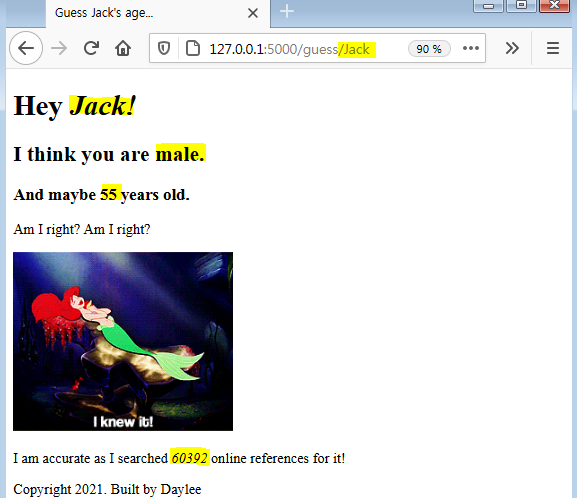
Jinja
Jinja is a Templating language.
To use python code in your website: put{{ python code }}in your html file.
- main.py
Passing over keyword arguments to be used in html file
import random
@app.route("/")
def home():
random_num = random.randint(1, 10)
return render_template("index.html", num=random_num )- index.html
Use double curly brackets to hold python code, which was passed over keyword argument from function at main.py
<h2>Random number: {{num}}</h2>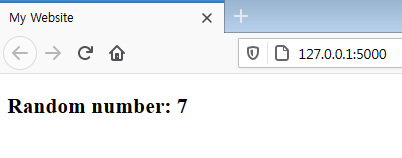
Task. Dynamic Footer Year
server.py
@app.route("/")
def home():
today_year = datetime.today().year
return render_template("index.html", today_year=today_year)
```
index.html
<body>
<p>Copyright {{today_year}}. Built by Daylee </p>
</body>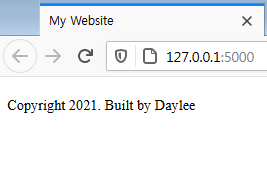
Task. Name and Age/Gender guess
Goal: Use name data API, create a url guess game.
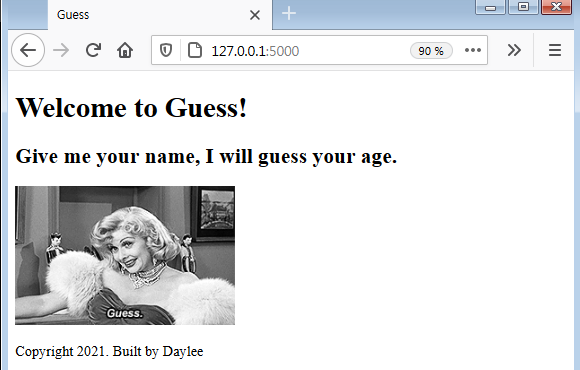

solution
server.py
variable rules, passing url:
<name>, guess function goes through the decorator method, it's going to give a value for this name variable(url typed by user), and catch that name send it over when I render the template
from flask import Flask, render_template
from datetime import datetime
import requests
app = Flask(__name__)
@app.route("/")
def home():
today_year = datetime.today().year
return render_template("index.html", today_year=today_year)
@app.route("/guess/<name>")
def guess(name):
today_year = datetime.today().year
parameters = {
"name": name,
}
response_gender = requests.get(url="https://api.genderize.io", params=parameters)
response_gender.raise_for_status()
gender_data = response_gender.json()
gender = gender_data['gender']
parameters = {
"name": name,
}
response_age = requests.get(url="https://api.agify.io", params=parameters)
response_age.raise_for_status()
age_data = response_age.json()
age = age_data['age']
count = age_data['count']
return render_template("guess.html", name=name, gender=gender, age=age, count=count, today_year=today_year)
if __name__ == "__main__":
app.run(debug=True)index.html
<!DOCTYPE html>
<html lang="en">
<head>
<meta charset="UTF-8">
<title>Guess</title>
</head>
<body>
<h1>Welcome to Guess!</h1>
<h2>Give me your name, I will guess your age.</h2>
<img src="https://media.giphy.com/media/13RcbHeXlLNysE/giphy.gif">
<p>Copyright {{today_year}}. Built by Daylee </p>
</body>
</html>guess.html
<!DOCTYPE html>
<html lang="en">
<head>
<meta charset="UTF-8">
<title>Guess {{name}}'s age...</title>
</head>
<body>
<h1>Hey <em>{{name.title()}}!</em> </h1>
<h2>I think you are {{gender}}.</h2>
<h3>And maybe {{age}} years old.</h3>
<p>Am I right? Am I right?</p>
<img src="https://media.giphy.com/media/Vu8bdTGdxEzCg/giphy.gif">
<p>I am accurate as I searched <em>{{count}}</em> online references for it!</p>
<p>Copyright {{today_year}}. Built by Daylee </p>
</body>
</html>Multi line statement
for, if ...etc statements
{% for %}
{{}}
{% endfor %}
n:point: creating API
<body>
{% for blog_post in posts: %}
{% if blog_post['id'] == 2: %}
<h1>{{ blog_post['title'] }}</h1>
<h2>{{ blog_post['subtitle'] }}</h2>
{% endif %}
{% endfor %}
</body>
URL Building
Hyperlink
To generate a hypelink, use anchor href and direct user to a specific page.
a href = {{ url_for('name of a function in the server') }}
server.py----------
@app.route('/blog')
def get_blog():
index.html----------
<a href="{{ url_for('get_blog') }}">Go To Blog</a> When you click on the link, it directs to /blog
When you click on the link, it directs to /blog

Specific url
Add parameters just like rendering html using keyword argument.
Be aware: {{ url_for('get_blog', num=3) }} parameter needs brackets!!!
server.py----------
@app.route('/blog/<index>')
def get_blog(index):
index.html----------
<a href="{{ url_for('get_blog', index=3) }}">Go To Blog</a>Task: Blog
- server.py
1) route function got input from user,
which is the value inside angle bracket <>
2) blog_posts function got hold of input value from decorator
3) return values to be used html template with Jinja
@app.route('/post/<int:number>') #1)
def blog_posts(number): #2)
response = requests.get(url="https://api.npoint.io/5ab~")
data = response.json()
print(number)
return render_template("post.html", posts=data, num=number) #3)- index.html
link: created an anchor href at home url('/'), it goes to blog_posts page, that has url path /post/1
<a href="{{ url_for('blog_posts', number=1) }}">Read</a>- post.html
Use json data values, which was returned from def_blog_posts(). With Jinja {{ }}, it reads Json data.
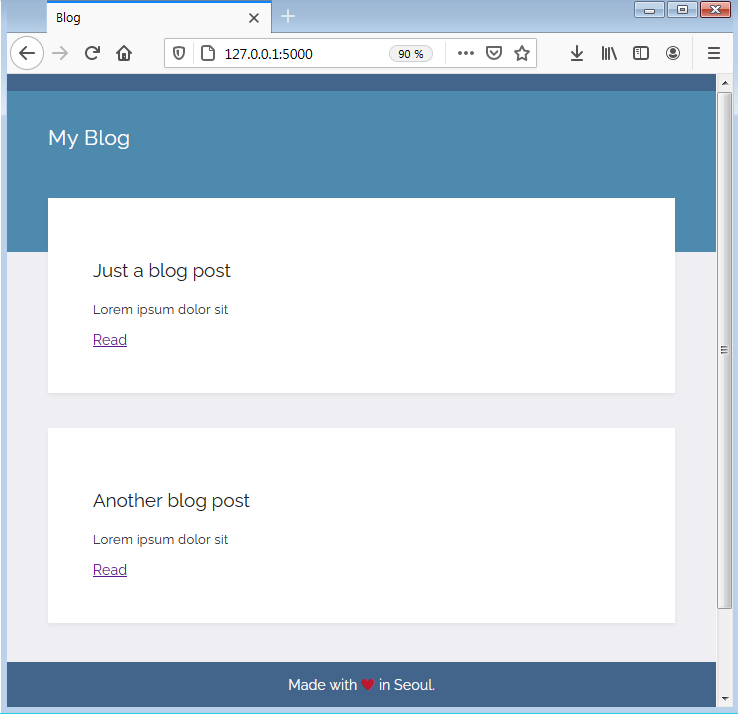

Project: Blog
Behaviour focused Docstring writing practice.